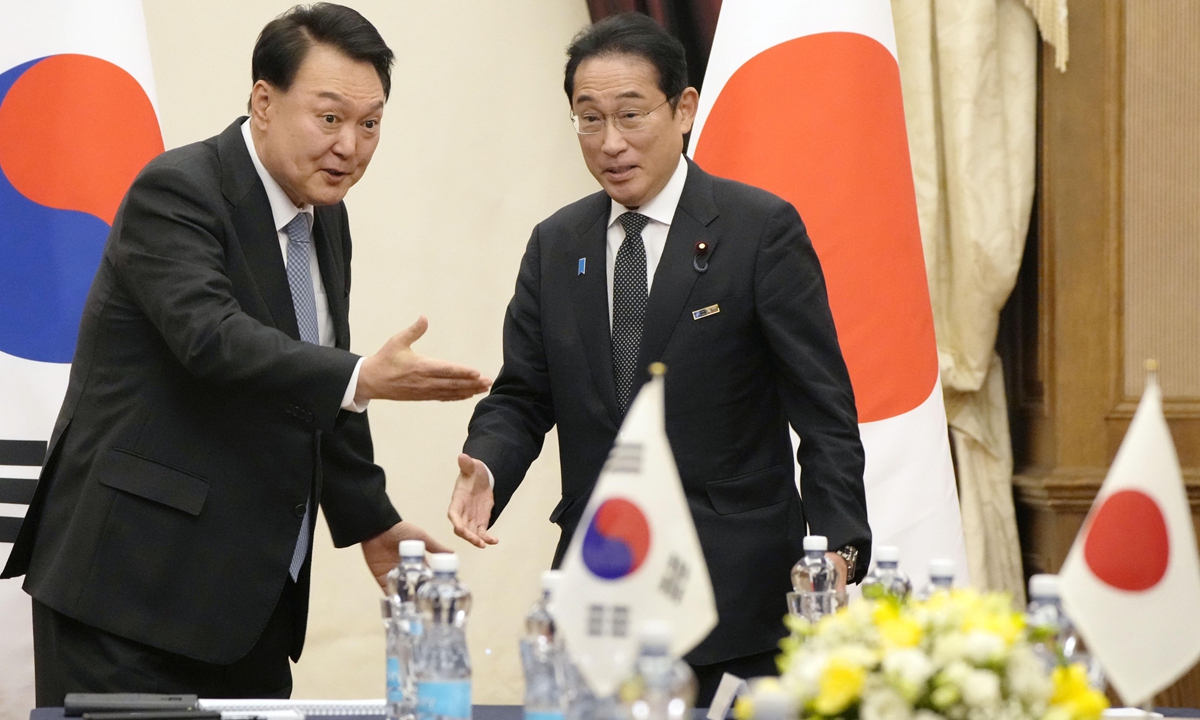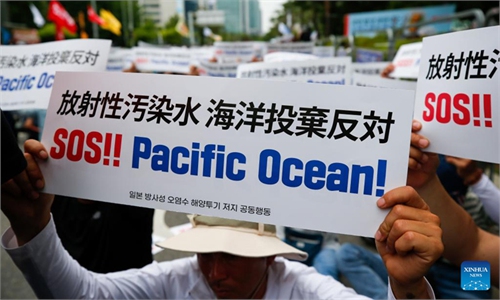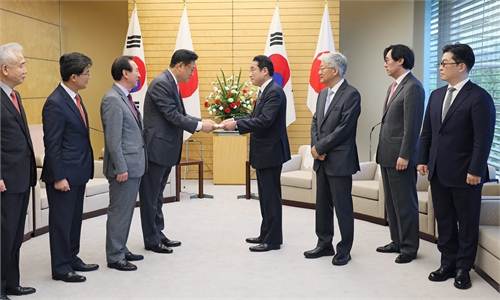Japan-S.Korea discuss on radioactive water dump at NATO, ASEAN meetings 'merely a show'

Japanese Prime Minister Fumio Kishida (R) and South Korean President Yoon Suk Yeol hold a meeting in Vilnius, Lithuania on July 12, 2023, on the sidelines of a NATO summit. Photo: VCG
South Korean President Yoon Suk-yeol met with Japanese Prime Minister Fumio Kishida on Wednesday on the sidelines of the NATO summit in Vilnius, with Tokyo's plan to dump nuclear-contaminated wastewater into the ocean high on the agenda among other topics such as security cooperation involving the US and technological research.
The meeting may not touch deeply on bilateral relations and bringing radioactive wastewater dump issue to this occasion is nothing more than a "stage show" that both Japan and South Korea need for their own political purposes, according to analysts.
Being strange bedfellows on many topics, however, the two countries are likely to further improve relations under the Yoon administration's strong push, analysts said, as Seoul believes that could facilitate a stronger alliance with Washington.
Japanese Foreign Minister Yoshimasa Hayashi, scheduled to meet South Korean counterpart Park Jin on the sidelines of the ASEAN meetings in Jakarta, will also explain Japan's dumping plan and seek understanding while taking into account a report on the plan released by the International Atomic Energy Agency (IAEA), per media reports.
Zhan Debin, director and professor at the Center for Korean Peninsula Studies at the Shanghai University of International Business and Economics, told the Global Times on Wednesday that most bilateral issues were discussed during mutual visits earlier this year, and the Wednesday meeting will not touch deeply on bilateral relations.
Japan wants to utilize the NATO occasion to get backing for its contaminated water dumping plan to "showcase approval at the international level" to offset widespread opposition and concern from neighboring countries, Zhan said.
Yoon, by raising Tokyo's nuclear-contaminated wastewater dumping issue at NATO, can more or less appease domestic anger against the connivance of his administration.
South Korea's main opposition Democratic Party of Korea has urged Yoon to use the summit to demand Tokyo halt its dumping plan. Opposition lawmakers at a press conference in Tokyo on Wednesday criticized the IAEA report and reiterated their calls for a review of the dumping plan.
The Yoon administration has shown strong and firm determination to bring forward South Korea's relationship with Japan despite public opposition due to the thorny historical issues stemming from Japan's invasion in the late 19th and early 20th centuries.
Policymakers in Seoul believe better Japan-South Korea relations can lead to more functional trilateral cooperation involving the US and a stronger US-South Korea alliance, Zhan said.
With this big picture to the fore, the nuclear-contaminated wastewater dump issue will not hamper Japan-South Korea interactions at the government level, Zhan said, but the issue will further impact mutual impressions of the people and erode the foundation of people-to-people exchanges.
But South Korea should also think of what an enhanced US-Japan-South Korea trilateral mechanism really means for itself, as in the US' blueprint, South Korea remains a lever in Northeast Asia to contain China, analysts said.
Under the "America First" doctrine, the dilemma and nightmare of US allies being abandoned have always existed. The more closely they are tied to the US, the heavier this nightmare will become, they noted.


